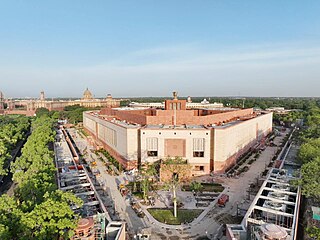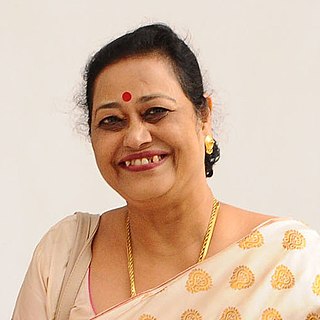Shri S.P.M. Syed Khan is an Indian politician from the All India Anna Dravida Munnetra Kazhagam party who represented Tamil Nadu in the Rajya Sabha, the upper house of the Parliament of India.

The Rajya Sabha, constitutionally the Council of States, is the upper house of the bicameral Parliament of India. As of 2023, it has a maximum membership of 250, of which 238 are elected by the legislatures of the states and union territories using single transferable votes through open ballots, while the president can appoint 12 members for their contributions to art, literature, science, and social services. The total allowed capacity is 250 according to article 80 of the Indian Constitution. The current potential seating capacity of the Rajya Sabha is 245, after the Jammu and Kashmir (Reorganisation) Act, 2019, the seats came down to 245. The maximum seats of 250 members can be filled up at the discretion and requirements of the house of Rajya Sabha.

The Lok Sabha, constitutionally the House of the People, is the lower house of India's bicameral Parliament, with the upper house being the Rajya Sabha. Members of the Lok Sabha are elected by an adult universal suffrage and a first-past-the-post system to represent their respective constituencies, and they hold their seats for five years or until the body is dissolved by the President on the advice of the council of ministers. The house meets in the Lok Sabha Chambers of the Parliament House, New Delhi.

The Parliament of India is the supreme legislative body of the Republic of India. It is a bicameral legislature composed of the Rajya Sabha and the Lok Sabha. The President of India, in their role as head of the legislature, has full powers to summon and prorogue either house of Parliament or to dissolve the Lok Sabha, but they can exercise these powers only upon the advice of the Prime Minister and their Union Council of Ministers.

The vice president of India is the deputy to the head of state of the Republic of India, i.e. the president of India. The office of vice president is the second-highest constitutional office after the president and ranks second in the order of precedence and first in the line of succession to the presidency. The vice president is also the ex officio chairman of the Rajya Sabha.
India has a parliamentary system as defined by its constitution, with power distributed between the central government and the states. India is the largest democracy in the world.

The speaker of the Lok Sabha is the presiding officer and the highest authority of the Lok Sabha, the lower house of the Parliament of India. The speaker is elected generally in the first meeting of the Lok Sabha following general elections. Serving for a term of five years, the speaker is chosen from sitting members of the Lok Sabha.

The Deputy Chairman of the Rajya Sabha presides over the proceedings of the Rajya Sabha in the absence of the chairperson of the Rajya Sabha. The deputy chairperson is elected internally by the Rajya Sabha.

The Leader of the House in Rajya Sabha is the leader and parliamentary chairperson of the majority party in the Rajya Sabha and is normally either a cabinet minister or another nominated minister. The Leader of the House is responsible for organising government meetings and business in the House. This office is not enshrined in the constitution and provided under the Rules of Rajya Sabha.
Rajya Sabha TV was an Indian public cable television network channel owned and operated by Rajya Sabha that covered the proceedings of Rajya Sabha. It has now been replaced by Sansad TV. Apart from telecasting live coverage of Rajya Sabha proceedings, RSTV also brought detailed analyses of parliamentary affairs. While focused on current national and international affairs, it provided a platform for knowledge-based programmes for the discerning viewer. The channel offered special attention to legislative business undertaken by the Parliament.

Raghav Chadha is an Indian politician and member of the Aam Aadmi Party. He is the youngest Member of Parliament, Rajya Sabha from Punjab, India. He was the former Vice Chairman of the Delhi Jal Board and MLA from the Rajendra Nagar assembly constituency in Delhi till 2022. Chadha has been elected as Member of Parliament, Rajya Sabha. He is also a practising chartered accountant.

A Member of Parliament in the Rajya Sabha is the representative of the Indian states to one of the two houses of the Parliament of India. Rajya Sabha MPs are elected by the electoral college of the elected members of the State Assembly with a system of proportional representation by a single transferable vote. Parliament of India is bicameral with two houses; Rajya Sabha and the Lok Sabha. The total number of members of Rajya Sabha are lesser than the Members of Parliament in the Lok Sabha and have more restricted power than the lower house. Unlike membership to the Lok Sabha, membership to the Rajya Sabha is permanent body and cannot be dissolved at any time. However every second year, one third of the members are retired and vacancy are filled up by fresh elections and Presidential nomination at the beginning of every third year.

Member of Parliament (MP) in India refers to persons who serve in the Parliament of India. These include:

Rajya Sabha elections were held in 2018 to elect the 65 retiring members of the Rajya Sabha, Indian Parliament's upper chamber. There were, as routine, three such elections held among relevant State and Union Territory legislators by single transferable vote (STV) and Open Ballot: on 16 January to elect 3 members from Delhi and 1 member from Sikkim; on 23 March to elect 58 members from 16 States; and lastly on 21 June to elect 3 members from Kerala. Being even-numbered, 2018 was a year in which about 30% of the State Legislature-elected 233-seat component of the body is elected. The other 12 seats of the body are appointed by the President.

Joyasree Goswami Mahanta is an Indian politician. She was a Member of Parliament, representing Assam in the Rajya Sabha the upper house of India's Parliament as a member of the Asom Gana Parishad. She is an Assamese language writer and educationalist. She was awarded India's fourth highest civilian award the Padma Shri in 2018.
2020 Rajya Sabha elections were the set of indirect elections by the members of State legislatures of India, to elect new members to fill vacancies in the Rajya Sabha – the upper house of the Parliament of India. The elections are held annually and throughout the year on an ad hoc basis. The elections in 2020 are for a total of 73 seats of which 55 of them were to be elected by March 26. The remaining were postponed due to the COVID-19 pandemic. The Election Commission of India later announced all the elections for the remaining 24 Rajya Sabha seats were to be held on 19 June 2020.
Rajya Sabha elections were held throughout 2022, to elect the retiring members of the Rajya Sabha, the Indian Parliament's upper house.

The Leader of the Opposition in Rajya Sabha is an elected Member of Rajya Sabha who leads the official opposition in the Upper House of the Parliament of India. The Leader of the Opposition in the Rajya Sabha is the parliamentary chairperson of the largest political party in the Rajya Sabha that is not in government.
The Leader of the Opposition in Lok Sabha is an elected Member of Lok Sabha who leads the official opposition in the Lower House of the Parliament of India. The Leader of the Opposition is the parliamentary chairperson of the largest political party in the Lok Sabha that is not in government. The post is vacant since 26 May 2014, as no opposition party has 10% Seats.
The Secretary General of the Rajya Sabha is the administrative head of the Rajya Sabha Secretariat. The secretary general is appointed by the Chairman of Rajya Sabha. In Indian order of precedence, the post of secretary general is of the rank of Cabinet Secretary, who is the senior most bureaucrat in the Government of India.